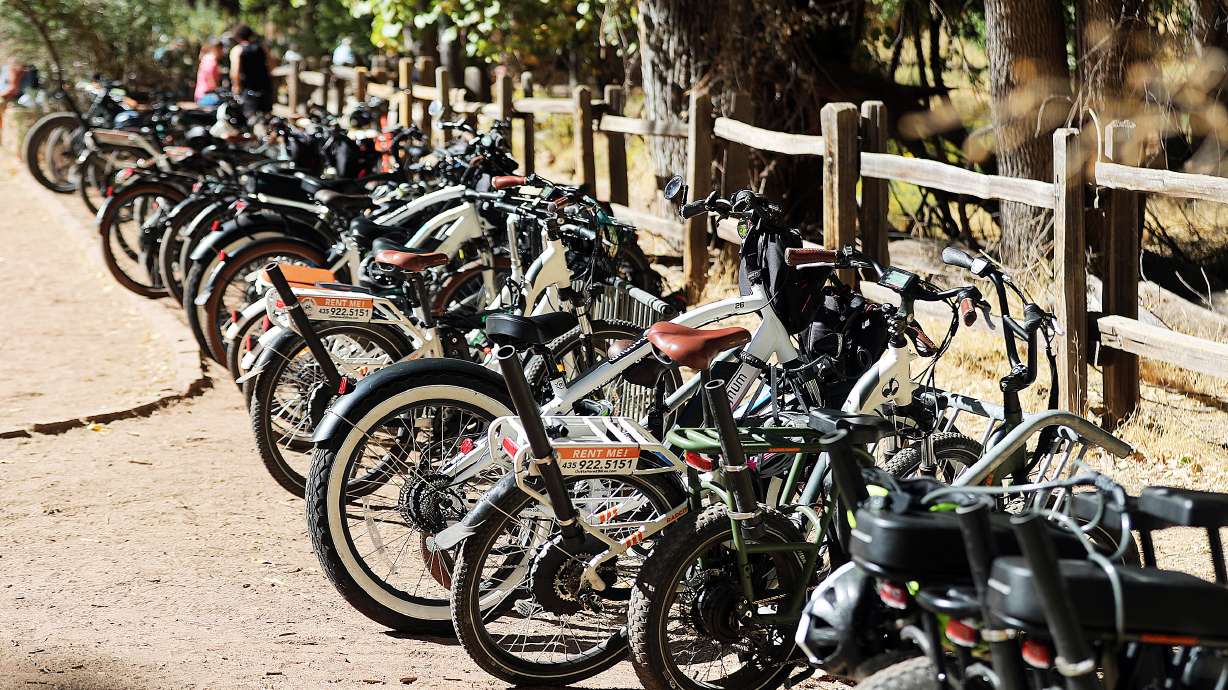Estimated read time: 3-4 minutes
This archived news story is available only for your personal, non-commercial use. Information in the story may be outdated or superseded by additional information. Reading or replaying the story in its archived form does not constitute a republication of the story.
SALT LAKE CITY — The National Park Service has decided that it will not make an overarching rule regulating how electric bicycles are used inside its parks, leaving decisions in the hands of every park on a "case-by-case basis."
The federal agency announced its decision on Friday in a short document that determined e-bikes at national parks posed "no significant impact," reaffirming a rule it initially handed down nearly four years ago.
"When managed appropriately, the use of e-bikes can enhance fun and healthy recreational opportunities for visitors to national parks and support active transportation options," park service officials said in a statement.
National Park Service officials under the Trump administration initially ruled in December 2020 that e-bikes are permitted anywhere regular bicycles are. However, that decision was challenged in court by an environmental group.
A judge in the U.S. District Court for the District of Columbia determined in 2022 that the initial rule didn't comply with the National Environmental Policy Act, ruling that the agency needed to complete an environmental assessment.
That led to a review of the plan with an open comment period last year, ending this month with the agency — this time under the Biden administration — essentially adopting the same rule.
Park superintendents are authorized to allow e-bikes anywhere deemed appropriate, such as park roads, parking areas and administrative roads and trails where traditional bicycles are also allowed, park service officials said. The ruling doesn't allow e-bikes in protected wilderness areas where bikes are also banned.
"When determining if and where e-bikes might be allowed in the park, superintendents must take into consideration public health and safety, natural and cultural resource protection, and other management activities and objectives," officials said in a statement.
So how are e-bikes being used in Utah's "Mighty 5"?
All five of Utah's national parks have adopted their own e-bike regulations over the past few years while the legal case played out. Per each park's website, all five generally allow e-bikes where traditional bicycles are permitted but there are some differences in language depending on where you go.
- Arches: E-bikes are allowed on all paved and unpaved roads in the park. They are not allowed anywhere off-road.
- Bryce Canyon: Both bikes and e-bikes are allowed on park roads and the park's shared-use path. They are not permitted on any other surface at the park.
- Canyonlands: Bikes and e-bikes are only allowed on any public roadway or parking area in the park.
- Capitol Reef: Bikes and e-bikes are allowed on all designated roads, campgrounds and paved viewpoints. They are not allowed on closed roads, in washes, trails — including those between campgrounds and roads — or anywhere else off-road.
- Zion: Class 1 pedal-assist e-bikes — bikes that only assist a rider when they are pedaling and don't assist after 20 mph — are allowed in all the same areas as regular bicycles. Both are allowed on the Pa'rus Trail, a multi-use path in the park, and on all roads in the park. However, e-bikes are not allowed on park shuttle buses and bikes aren't allowed through the Zion-Mount Carmel Tunnel.
National parks in other states may have different regulations, so it's best to review park rules or contact the park before riding.










